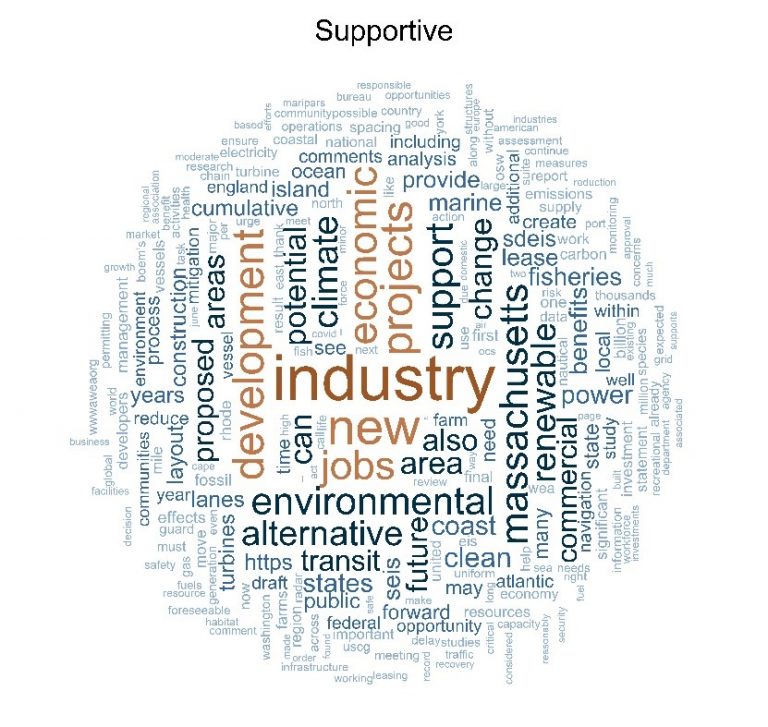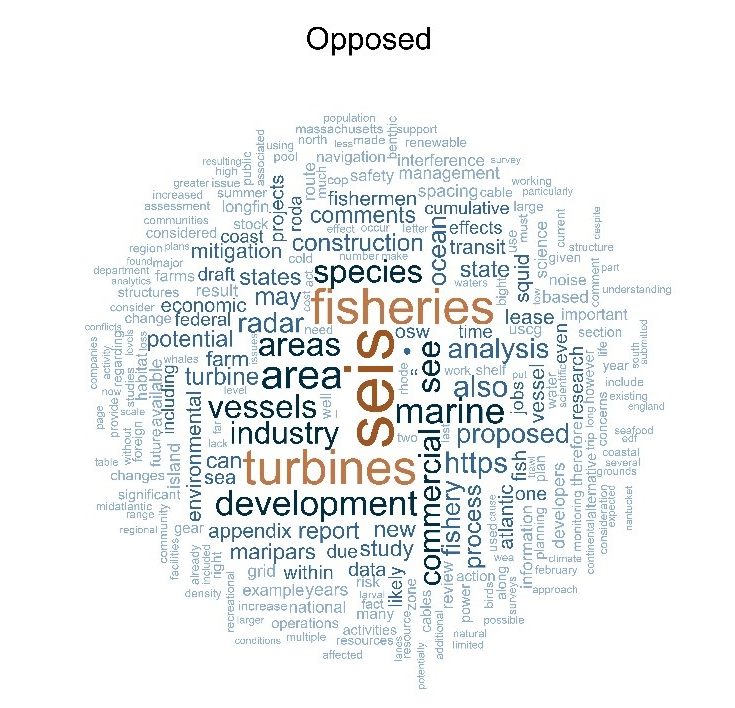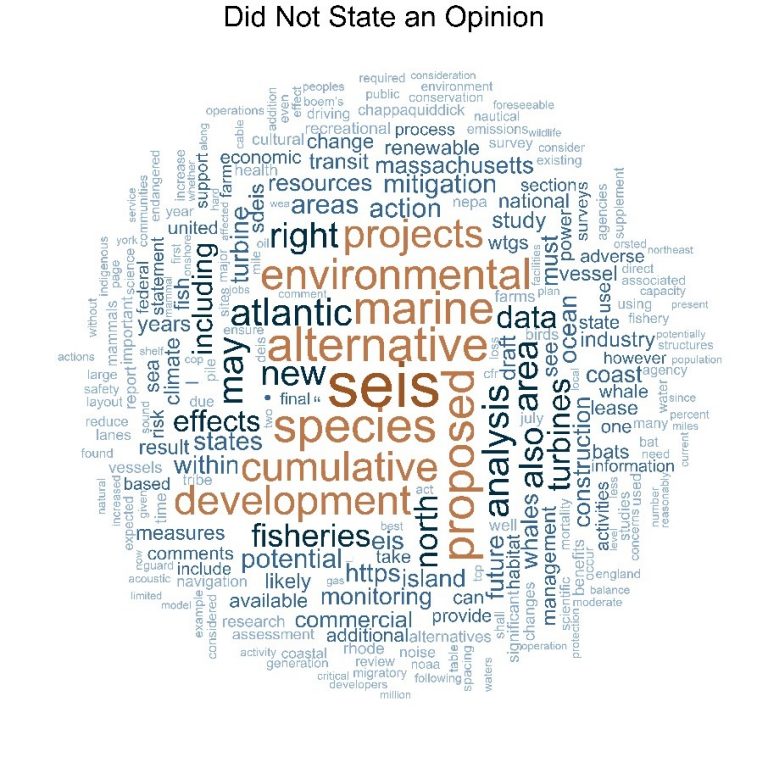ISSUE NO. 24: INSIGHTS FROM PUBLIC COMMENTS ON AN OFFSHORE WIND EIS: PART II
This is the second in a series of notes analyzing public comments on the Supplement to the Draft Environmental Impact Statement recently issued by BOEM for the Vineyard Wind I project. In the first note, we discussed the quantity and type of comments submitted during the public comment period, as well as key themes in the comments and their implications for businesses seeking to develop offshore wind projects in the US. In this note, we more closely examine patterns in comments by comparing comments by those who support, oppose, or do not state opinions on the project.
In planning public outreach and engagement for a major infrastructure project, it is important to understand interested, influential, and impacted stakeholders. There is value in understanding this entire range of stakeholder, but greater insight, and deeper, more meaningful engagement can occur if a project proponent or regulating body takes the time to understand the perspectives of specific stakeholder groups and to target communications, outreach, and engagement activities accordingly. While stakeholders (and their comments) may be grouped by their proximity to or manner of interaction with a project, here we examine themes and patterns in stakeholder comments by their support for, opposition to, or lack of stated opinion on offshore wind and/or the Vineyard Wind I project. (See footer for notes on our methodology)
HOW DO COMMENTS DIFFER BY COMMENTER PERSPECTIVE?
(Note: Comments analyzed here are a subset of the 738 unique comments discussed in our previous note)
Supporters:
- 497 supporters (67% of unique comments)
- Who are they?
- People with a local or regional connection (16% of supportive comments)
- Members of the offshore wind or supporting industries (15%)
- Others with specialist expertise (10%)
- Residents of directly impacted areas (8%)
- What do they talk about?
- Vineyard Wind I project (71% of supportive comments)
- Offshore wind in general (33%)
- A different project or topic (1%)
- Only 21% of supportive comments specifically referenced the EIS
- Most-mentioned issues: (Note: Percentages do not add to 100% as most comments mentioned multiple issues)
- Climate change and clean energy (62% of supportive comments)
- Job opportunities (52%)
- Economic benefits (37%)
- Marine navigation and turbine spacing (28%)
- Commercial fishing (14%)
Opposed:
- 100 opposed (14% of unique comments)
- Who are they?
- Representatives of the commercial fishing industry (19% of opposed comments)
- Representatives of businesses or industries that are dependent on ocean resources, but are not fishing or energy (8%)
- What do they talk about?
- Vineyard Wind (66% of opposed comments)
- Offshore wind in general (31%)
- A different project or topic (4%)
- Only 34% of opposed comments specifically referenced the EIS
- Most-mentioned issues:
- Commercial fishing (77% of opposed comments)
- International businesses as project proponents (44%)
- Marine mammals (42%)
- Marine navigation and turbine spacing (34%)
- Other issues (34%)
- Habitats, wildlife, and sea life (26%)
Did not state an opinion:
- 119 did not state an opinion (16% of unique comments)

- Who are they?
- Others with specialist expertise (19% of comments that did not state an opinion)
- Representatives of offshore wind or related industries (10%)
- Representatives of Federal, State, and Local governments (9%)
- What do they talk about?
- Vineyard Wind (57% of comments that did not state an opinion)
- Offshore wind in general (44%)
- A different project or topic (3%)
- Only 48% of comments that did not state an opinion specifically reference the EIS
- Most-mentioned issues:
- Marine navigation and turbine spacing (38% of comments that did not state an opinion)
- Commercial fishing (35%)
- Other issues (34%)
- Climate change and clean energy (32%)
- Job opportunities (24%)
- Habitats, wildlife, and sea life (22%)
WHAT STOOD OUT/SURPRISED US?
Almost as many supporters referenced marine navigation and turbine spacing as opposers – While it is somewhat surprising to see such a specific issue referenced frequently by both supporters and opponents, this makes sense in the context of the publication of the Supplement to the EIS. One key reason for the preparation of this document was to consider cumulative impacts (including navigation impacts) of multiple wind farms on marine users. It is likely that both supporters and opponents mention this issue so frequently because it has been well-publicized recently in ways that previous ‘hot-button’ issues (viewsheds, and marine mammals) have not been.
Commenters who did not state an opinion were far more likely to mention the EIS (and most supporters did not) – This suggests that, per our observations in our previous note, commenters seem to have their minds made up, and/or are commenting on the basis of their own concerns instead of reading the project-specific EIS and considering project-specific issues.
WHAT ARE THE KEY TAKE-AWAYS AND IMPLICATIONS FOR PLANNING FUTURE OSW DEVELOPMENTS?
Overall, those commenting predominantly support the project and OSW in general – This indicates a public that is open to the concept offshore wind and sees broad societal benefits. Given that comments are focused largely on climate change mitigation and economic benefit impacts (for supporters) and commercial fishing (for opponents), future OSW planning and engagement efforts may be well advised to prioritize these topics (over preservation of marine life or other issues, for example) so as not to stretch community engagement programs and resources too thin.
Implication: Communications around specific topics of concern may help to reinforce existing positive perceptions and enable more efficient, targeted outreach efforts.
Supporters see societal benefits; Opponents see local impacts – Supporters were the largest group of commenters but relatively less likely to discuss specific, local issues. Most of the issues they referenced and key words they used were relatively abstract, focusing on economic benefits, industrial development, and climate change mitigation that would impact society as a whole. This was in contrast to opposed commenters who focused more on to tangible impacts of turbines on fishing that might affect individuals (or represent risks to project proponents).
Implication: Regardless of the prevalence of support, it will be important to dedicate time, attention and expertise to address substantive concerns of those who may (or if satisfied, may not) be obstacles to project development.
Mentions of some issues are strongly associated with support or opposition – Commenters opposed to Vineyard Wind or offshore wind in general were far more likely that supporters to discuss impacts to commercial fishing (77% of opponents discuss this vs 14% of supporters), or the dynamics of foreign businesses developing OSW projects in the US (44% of opponents vs 0% of supporters). In contrast, climate change and clean energy was mentioned by a much larger percentage of supporters (62%) than opponents (7%).
Implication: Mapping stakeholder perceptions to stakeholder groups allows for targeted dissemination of information.
Methods: During our review of the comments, we categorized each one as ‘supportive’, ‘opposed’, ‘unsure’, or ‘did not state an opinion’ based on the commenter’s stated views. We recorded only opinions that were specifically stated (i.e. ‘I support this project’ or ‘There should be a moratorium on offshore wind development’) and did not record an assumed opinion based on the identity of the commenter (i.e. assuming an offshore wind developer would be supportive). A small number of commenters expressed multiple opinions, in which case we recorded both, however the data compiled for each group includes only comments that expressed a single opinion (i.e., only supportive, not supportive AND opposed). Due to the very low number of commenters that expressed that they were ‘unsure’ (6 of 738), we do not analyze those comments here. Note too, that the opinion stated in the comment is independent from the subject of the comment. In other words, a supportive comment indicates support for something (offshore wind, Vineyard Wind I, etc.), but does not indicate subject to which that support is directed.
News & Notes

Acorn International
1702 Taylor St, Suite 200B
Houston, TX 77007, USA
1213 Purchase St
New Bedford, MA 02740, USA

